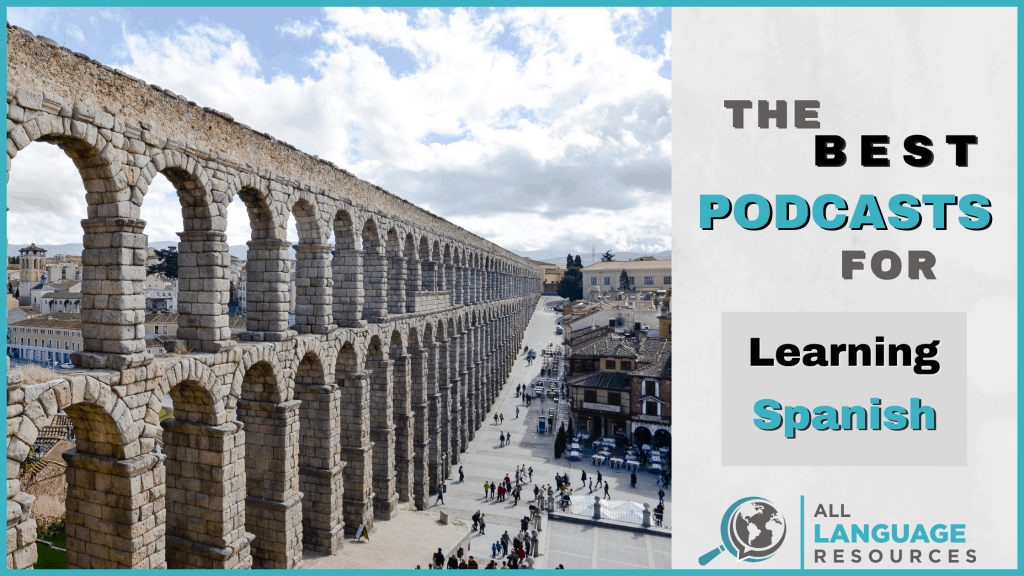Podcasts are one of the best ways to learn Spanish. Not only can they improve your listening comprehension, but you can also use them to practice speaking. Shadowing and the interview method are just two of the many self-study activities you can pair with podcasts to enrich your experience.
You can also enjoy learning two things at once, such as Latin American History or the inner workings of your own mind — all while increasing your Spanish vocabulary.
But, as we know, anyone can publish a podcast. So how do you know which ones are both enjoyable and level-appropriate?
That’s where we come in. Below are our top 35 recommendations for Spanish podcasts, organized by level for your listening enjoyment. Choose one or many to accompany you on your Spanish learning journey.
Table of Contents
ALL LEVELS
Notes In Spanish

Notes in Spanish is suitable for learners at any level. It has beginner, intermediate, and advanced podcasts with natural conversations between Ben (from England) and Maria (from Spain).
Ben and Maria cover a wide range of topics: one day you may be touring their home, the next you’ll be listening to them discuss introverts, Yo-Yo Ma, or culture shock. The episodes usually come in 10 minute chunks so you can acquire some new vocabulary on the go.
Beginners may need some additional support to progress from the translation exercises in the beginner episodes to full immersion in the intermediate episodes. Worksheets and transcripts are only available in course packs on their website, though they may be a bit pricey.
Spanish Obsessed

Spanish Obsessed seems quite similar to Notes in Spanish, except that it uses Latin American Spanish. Lis (from Colombia), and Rob (from England), explore real-world topics with natural conversations for beginner, intermediate and advanced levels. They even have an additional pre-beginner level to help you transition into the beginner episodes.
Subscribing to the pro version on their website gives you interactive, time-stamped transcripts with notes, translations, and quizzes. There are also extra podcast courses for conversation, pronunciation, and vocabulary.
The advanced episodes feel more like upper-intermediate Spanish, so advanced learners may not feel as challenged. If you’re interested in language-learning techniques, you can check out their other podcast, “Reaching for Words”, where they interview linguists and polyglots.
SpanishPod101

Although SpanishPod101 requires a paid membership, it comes with some advantages. There are thousands of bite-sized podcast-style dialogues for beginner to advanced learners, plus lesson notes, quizzes, flashcards, and translations. You can also compare your voice to a native speaker’s with each individual line of dialogue.
The platform has lesson paths for Costa Rican, European, Mexican, and Peruvian Spanish. There are also categories like business Spanish, expressing emotions, and reading comprehension exercises.
SpanishPod101 can be a bit confusing with all the available lesson paths and episodes, but once you find your lesson path it will probably be worth your while. There’s a 7-day free trial when you sign up for a free account. The podcast is also available as a Spanish app. See our full review for more details.
Lightspeed Spanish

Gordon and Cynthia, a British/Spanish couple, use blog posts, YouTube videos, and podcasts to offer comprehensive lessons on over 160 topics. Though LightSpeed Spanish is available on Apple Podcasts, the blog posts on their website can provide helpful context for each episode. You can also buy transcripts, worksheets, and private lessons.
Beginner and early intermediate learners will start with basic grammar and expressions. Then you can move on to full immersion in the Advanced Intermediate lessons, where Gordon and Cynthia cover cultural topics and more advanced grammar.
The advanced level mostly leaves grammar behind as it reinforces what you previously learned through a variety of topics — from stories to swear words to politics.
BEGINNER
Language Transfer

Language Transfer provides a series of introductory audio courses for several different languages — including Spanish.
You won’t spend as much time immersed in the language, but you will go into depth about how the Spanish language works. You’ll learn major grammar points and develop vocabulary and pronunciation. You’ll also hear the instructor, Mihalis, interact with a beginner student and correct their mistakes. The goal is to respond to prompts as if you yourself were the student.
Language Transfer can support anyone looking to understand the ins and outs of learning Spanish. If you’d like to get a better sense of what it’s all about, you can read our full review.
Coffee Break Spanish

The Coffee Break Languages series — available in French, German, Italian, Swedish, Chinese, and Spanish — is a podcast for beginner to intermediate learners. Most of the episodes last about the duration of a 30-minute coffee break. There are also the 10-minute Espresso episodes if you need a quick shot of Spanish studies to go.
Each Spanish conversation has an English discussion and analysis at the end. This makes it a great option for learners who prefer to have more context to their learning. You’ll get the most out of this series by responding to the prompts aloud. It’s also best to start at episode one if you have no background in Spanish.
Extra lesson notes and video pronunciation practice are available in the Premium version. But, you’ll be fine listening to the podcasts on major streaming platforms. To learn more, check out our full review.
INTERMEDIATE
Duolingo Spanish Podcast

Hosted by Martina Castro, one of Radio Ambulante’s co-founders, it’s not surprising that Duolingo’s Spanish Podcast is engaging. Each 20-minute episode follows true-life stories and alternates between English and Spanish. Experience the journey of a soccer coach fighting for girls’ rights to play in Buenos Aires. Or, see the Río Bank robbery from the thieves’ point of view in a 6-part series. You’ll find that English is not used to translate any of the Spanish stories, but rather as a means to provide context.
The English and Spanish flow together seamlessly. But, this isn’t a podcast for individuals looking for Spanish immersion. It is more for learners who are not yet ready for Radio Ambulante’s immersive Spanish episodes — or for anyone wanting to enjoy bilingual content.
Doorway to Mexico

Season one of Doorway to Mexico follows Paulina and her students on their travels through Mexico. The dialogues include a mixture of English and Spanish, so this isn’t a podcast for Spanish immersion. It is intended for intermediate to advanced learners, though it could also be for inspired beginners who want to hear naturally-paced Spanish without feeling too overwhelmed.
Each episode includes dialogues between Spanish speakers and learners in real-life situations. With a focus on Spanish colloquialisms for everyday communication, these conversations will help you sound less like a textbook and more like a local.
Season Two follows the same characters, but focuses more on everyday communication skills. The round-table discussion after each episode talks about different vocabulary words, cultural notes, and grammar points.
StoryLearning Spanish
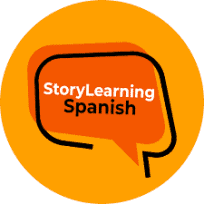
Olly Richards created StoryLearning Spanish for lower-intermediate learners. He helps you to overcome the intermediate plateau through level-appropriate stories.
Each 10-minute episode allows the same storyline and is narrated by a professional voice actress in Iberian Spanish. A free transcript and a glossary with 10 of the most important words from every chapter can be found in the episode description on Apple Podcasts, Google Podcasts, and Spotify.
If you enjoy these episodes, you also might like Olly’s course, Conversations. It splits a dialogue-based story into 20 chapters and uses key expressions for everyday conversation.
Spanish and Go
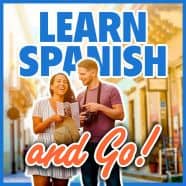
Jim and May’s podcast, Spanish and Go, focuses on real-world travel Spanish — not the Spanish you’ll find in a travel guide. Although based in Mexico, the duo interviews Spanish speakers from Costa Rica, Equatorial Guinea, Vera Cruz and more to give you multiple perspectives on Spanish language and culture.
Through natural conversation you can explore food and traditions from different Spanish-speaking countries. You’ll also hear the voices of many different podcast hosts and polyglots, such as Connor Grooms and the teams from No Hay Tos and How to Spanish.
Unlimited Spanish Podcasts
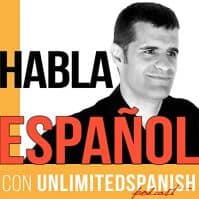
Oscar avoids the traditional textbook methods of learning languages by helping his audience think in Spanish. His 5-minute episodes include short stories with exercises. Some of these exercises require you to respond aloud to his questions, while others introduce you to the same story in two different verb tenses. The goal is to learn Spanish intuitively without drilling vocabulary or grammar.
Although Oscar speaks at a slower-than-natural speed, he still introduces vocabulary that would be new even to the upper-intermediate learner.
There are over 220 free episodes with full transcripts on his website, where you can also try samples of his paid courses. Or, check him out on major streaming platforms.
Spanishland School and Españolistos

From Spanishland School — a YouTube channel, instructional program, and podcast — Andrea provides 10-minute Spanish Tips for intermediate and advanced Spanish learners. There are some English translations, but most of the episodes are in Latin American Spanish.
Most of the over 275 episodes include useful tips on nuanced grammar and practical Spanish expressions. What’s the difference between Como vs. Me Como? What about key expressions to use with the Subjunctive tense? And what 8 different ways can we use the word “llevar”?
To practice listening to conversational Spanish, you can also check out Andrea’s other podcast, Españolistos. She and Nate, an American, converse mostly in Spanish to talk about a variety of topics — including but not limited to the Spanish language, travel, books, and history.
Spanish Language Coach

Meet César, a certified Spanish teacher. He integrates personal anecdotes with psychology, society, technology, culture, and language-learning into his 10-20 minute Spanish-immersion podcast episodes. To access episode transcripts, sign up for a free account on his website.
If you want to hear more from César, you can find him on YouTube, Instagram, or through online private classes.
He also offers a free guide for how to learn Spanish, though this is written entirely in Spanish. It helps intermediate learners overcome the intermediate plateau by providing tips and resource recommendations to make the process more manageable.
INTERMEDIATE/ADVANCED
Hablamos Espanol

Intermediate to advanced learners can tune in to this podcast to learn more about Mexico, explore Spanish expressions, and get to know different Spanish speakers. You’ll meet people from Spain, Puerto Rico, Mexico, Venezuela and more.
The host, Borja from Spain, has a conversation style with lots of energy. Although he speaks at a natural speed, he articulates clearly enough for intermediate learners to understand. The content covers debates, news, cultural comparisons between different Spanish speaking countries, and the Spanish language.
You can also watch some of the interviews on Borja’s YouTube channel.
Español Con Juan

Juan Fernández used to teach Spanish at University College London. Now he offers immersive Spanish YouTube videos, courses, graded readers, and podcast episodes for intermediate to advanced learners.
Juan believes that most Spanish courses put too much emphasis on grammar and vocabulary lists. He prefers to put the language in context using stories.
If you tune into his podcast, you can hear him repeating key expressions as he talks about politics, culture, language learning tips, and personal anecdotes. You’ll feel like you’re listening in on a conversation, even though he usually presents by himself.
It’s obvious that Juan is passionate about teaching and is invested in his audience’s success. Although it’s more apparent in his YouTube videos, he also has a great sense of humour and an animated personality.
No Hay Tos
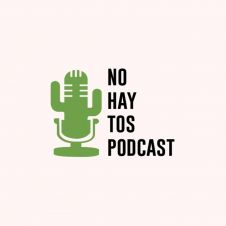
No Hay Tos is an intermediate to advanced level podcast hosted by two native Spanish speakers from Mexico: Roberto and Héctor. Their 20-minute conversations are entirely in Spanish, and focus a lot on Mexican culture and the Spanish language.
Although it is a podcast for Spanish learners, the hosts aren’t shy about using lots of colloquialisms and contractions. It’s probably the closest to eavesdropping on a conversation between Spanish speakers you can get without having to be there in person. But intermediate learners won’t get too lost, as Héctor and Roberto will often pause their conversation to elaborate on difficult words or slang terms.
There are full transcripts of their episodes available through their Patreon page. These can help you identify words that may typically be spoken faster, or skipped altogether in natural conversation. If you sign up for their newsletter, you will get a free transcription every month.
Spanishpodcast.net
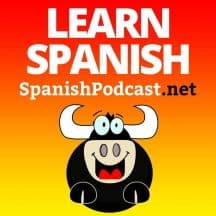
These scripted, 15-25 minute episodes provide lots of examples of how to use words in context. The narrator focuses on daily expressions, history, traditions, or random topics like unsolved mysteries.
The narrator does a good job of explaining key phrases, sometimes telling you multiple stories to explain the word in context. He might also introduce a specific theme to expand your vocabulary on a given topic.
There are currently over 400 episodes, with transcripts and videos available for free on the website. If you are a beginner who wants to jump into immersion right away, the website also has 29 lessons to introduce you to basic Spanish.
Español Automático
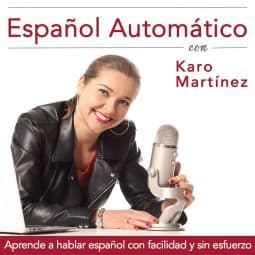
With a degree in Teaching Spanish as a Second Language and Translation, Karo Marínez advertises a natural, fun, and stress-free method for learning Spanish. She also uses her experience in learning English, French, and Polish to help her listeners learn Spanish with ease.
Sometimes Karo is joined by a fellow presenter, though the episodes remain presentational rather than conversational. Most of the episodes focus on using Spanish to explore grammar and language-learning tips. They might give you a five-step plan to learn Spanish, 9 tips to sound like a native speaker, or 18 Spanish expressions with ‘Los Ojos’.
You can subscribe to their Patreon to get flashcards, transcripts, extended podcast episodes, and more. There are also courses available for purchase on the website.
Palabras Bravas

From the creators of Babbel comes a Spanish-only podcast that combines storytelling with vocabulary explanations. Babbel is known for having a conversational approach, and doesn’t let that slide in their 20-30 minute podcast episodes.
The hosts include native European and Latin American Spanish speakers, and an advanced Spanish learner. They use the mysterious story of three flatmates in Madrid to take you through real-life situations. After the story, you can listen to the hosts discuss colloquialisms, idioms, and differences between Spanish-speaking regions.
The first season of the app is based on Babbel’s courses, so if you have a subscription you can reinforce your understanding of the episodes in the Curso avanzado 1. If you don’t have a subscription, you can still access each episode’s Spanish Learner’s Guide on their website.
How to Spanish Podcast

Ana and David’s free, presentation-style episodes are 99% in Spanish. These weekly episodes aim to improve your listening comprehension by discussing topics at a natural pace. Intermediate learners will probably understand most of each episode with the hosts’ clear explanations and articulation.
The duo covers Spanish culture, music, history, technology, news, stories, and more. They will often explain new vocabulary in Spanish, though there are sometimes translations for nuanced expressions.
You can receive a good amount of extra content by becoming a Patreon supporter: transcripts, vocabulary guides, references, listening comprehension questions for each episode, bonus episodes, and ad-free YouTube videos.
The most unique benefit of becoming a Patreon is the interactive transcript, which follows the audio by highlighting each individual word. You can click on a word to skip forward or backwards as well.
Charlas Hispanas

Charlas Hispanas focuses on Spanish from Colombia, Mexico, Peru, and Argentina. The podcast dedicates every day of the week to a specific theme: Mondays explore the theme of the month, while Tuesdays follow the culture and most relevant historical events of different Latin American countries.
On Wednesday you can tune in to learn about different expressions and grammar points that will help you communicate like a native speaker.
If you enjoy learning about current events, you can learn about three different news articles from events around the world every Thursday. Fridays are more flexible and cover a wide range of themes.
As a premium subscriber, you get access to full transcripts with exercises and explanations. It’s available on Apple Podcasts, or you can download the MP3s directly on the website.
Hoy Hablamos
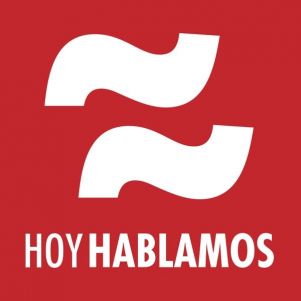
Hoy Hablamos has published over 1000 podcast episodes for daily vocabulary and expressions, and over 140 episodes dedicated to specific grammar points. You will learn about the latest news from around the world, famous Spanish figures, and Spanish culture. The narrator also provides useful tips and advice for how to learn Spanish.
The episodes are entirely in European Spanish, but the narrator, Roi, articulates clearly and speaks slowly enough for intermediate learners to follow along.
With a premium membership, you can access transcripts, exercises, and extra podcast episodes. You can also vote for and suggest themes for podcast episodes, plus ask questions to Spanish teachers over email.
News in Slow Spanish

News in Slow Spanish is a paid resource for intermediate to advanced learners who aren’t quite ready to listen to full-speed news broadcasts. It publishes news at a level-appropriate speed, highlighting important grammar and expressions in the transcripts.
The lessons are about 30 minutes long and include 4 separate news stories. You can take quizzes and practice your pronunciation after each episode.
Upper-level beginners can check out the “Get Up to Speed” course, which will cover the foundations needed to start the intermediate program. There’s also an advanced “Change of Pace” course for those who are almost ready to take on native content. Read our full review for more information.
PodcastsinSpanish

PodcastsinSpanish.org may have an outdated interface, but it has a ton of content for elementary to advanced speakers. Its bite-sized, 2-4 minute episodes are an excellent resource for anyone who is struggling to find time for their Spanish studies.
You may feel like the dialogue is a bit scripted in the first level, but by level three the conversations and interviews flow naturally. You’ll hear a variety of accents covering everyday topics, such as the weather, work, extracurricular activities, food, events, and shopping.
Their original website has a finite number of episodes — about 92 for each of three levels. But, their new website, Podcastsinspanish.com, has new content added weekly. Unfortunately, you’ll have to pay on each site separately to get access to transcripts and worksheets.
ADVANCED
Radio Ambulante

Radio Ambulante is an award-winning Spanish language podcast. Their high-quality episodes explore in-depth stories from Latin American using long-form audio journalism. The 30-45 minute episodes feature a variety of Spanish dialects and are most suitable for intermediate to advanced learners.
Each episode is entirely in Spanish. You can find free transcripts (and some translations) for every episode on Radio Ambulante’s website. They also have El Hilo, which focuses on the most important news story from Latin America and explores the story behind the news.
Their episodes are available on major podcast platforms, on their website, and on Lupa — an app for intermediate learners.
Historias Perdidas

Based on his books and radio stories, journalist Leon Krauze takes you on a journey through Mexico’s unsolved mysteries. You may never have wondered about Moctezuma’s treasure, the Amber Room, or the Bell Witch. But, with sound effects, music, and Leon’s engaging voice, these stories will keep you captivated.
Because Leon clearly articulates his words, even intermediate learners can also enjoy practicing their listening comprehension with these stories. Although there is no transcript, you can find similar stories in his book.
Leon also has another podcast, La Mesa, Con Leon Krauze, which tells stories of the lives of Hispanic immigrants in the United States.
LAS RARAS

Las Raras is a non-fiction documentary podcast about fighting for social change. Similar to Radio Ambulante, it uses narrative journalism to tell stories not typically found in traditional media.
With a strong focus on social movements, the Chilean journalist and sound engineer duo goes into the field to cover art, education, gender, migration, and more. They bring themes that break conventional rules to the foreground.
The sounds you hear in each episode come directly from the story’s origin, and every piece of music is an original composition.
These high quality episodes have won numerous awards and have been featured on popular websites, like El País.
Entiende Tu Miente
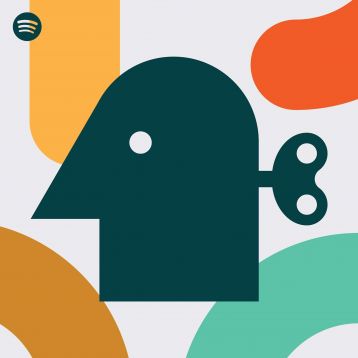
If you struggle to find time for both personal development and your Spanish studies, Entiende Tu Miente lets you work on both at the same time.
Four hosts — two psychologists, a university professor, and a psychology student — spend 20 minutes each week helping their listeners understand their own minds. Members of Club ETM can submit an audio clip describing a difficulty they are experiencing, which will then be discussed by the hosts.
Over 170 episodes already cover topics such as indecision, embarrassment, passive aggressivity, and emotional dependence.
Español de América

The podcast, Español de América, benefits from the comprehensive knowledge of Eva Bravo, a Spanish language profesor at the University of Seville. She gives her listeners a preview of topics that she investigates in her professional career.
Advanced learners and native speakers alike can learn key information about the language, history and culture of both Latin America and Spain. Given Eva’s endless resume, including a PhD and additional teacher training, you can be sure to acquire a wealth of knowledge in just 10-20 minutes.
TED en Español

You have probably already seen a TED talk and been impressed by at least a few new ideas about education, technology, health, and more. Why not explore these ideas in Spanish?
TED in Español’s 10-20 minute episodes feature speakers with a variety of Spanish accents. This makes it an excellent resource for improving your listening comprehension. And, typical to the TED brand, most of the presenters share notable accomplishments or insights into diverse topics. Whether you love AI or people, math or literature — you’ll probably find something that peaks your curiosity and improves your Spanish at the same time.
HistoCast

History buffs will enjoy the Spanish series, HistoCast. These 2-4 hour episodes are published every second Monday and primarily focus on military history.
Instead of a presentation you might expect from the history channel, you can listen to a relaxed conversation between eight friends about history from all around the world. These hosts include a mixture of Geography majors, authors, magazine editors, and individuals passionate about history.
They now have over 10 seasons with over 100 episodes. Every other Monday, when they don’t publish a full HistoCast, you can enjoy a short BlitzoCast or crossover episode with another podcast.
Cosas de Internet
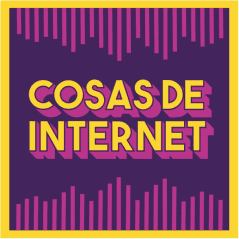
The co-hosts of Cosas de Internet use their extensive experience in radio and production to explore and explain modern technology. Laura has helped produce several independent radio shows and is a production manager at Radio Ambulante. Her co-host, Santiago, has made a profession from explaining ideas on YouTube.
The episodes are conversation-style, but have been edited to make them more entertaining. Santiago and Laura also research and fact-check all of their information before publishing an episode to ensure that what you receive is evidence-based.
Check out their website to read episode notes that help you further explore the themes mentioned in the series.
Fallo de Sistema
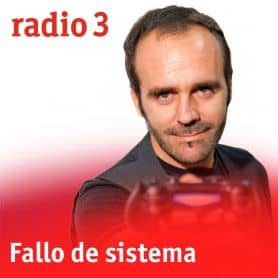
Do you like science, comics, fiction, video games, and movies? With RTVE’s Fallo de Sistema, advanced learners can explore these topics and their related terminology every week. If that’s not enough, search the archives of over 400 episodes to find specific topics that interest you.
Their most recent episodes discuss Cyberpunk, the Avengers, Nebuchadnezzar, and Isaac Asimov. Though not available on all major platforms, you can listen to the podcast on the website or on Apple Podcasts.
El País

El País is one of the most popular liberal news sites in Spain. It also authors several different podcasts — some ongoing, others with limited episodes. It’s a great option for advanced learners who want to improve their listening comprehension while keeping up with current events.
Although the website itself limits the articles you can view without a subscription, Apple Podcasts has 11 different series to explore: audio reportings of recent new stories in Las Historias, interviews with influential people in Extra EPS, all about Covid-19 in Crónicas de un Virus, fashion in La Moda, and much more.
Nómadas

Produced by RTVE, Nómadas brings you on multiple adventures around the world. Take an hour to visit the Nayarit rivers, Las Palmas de Gran Canaria, remote islands in Japan, or Manitoba.
This series is like a sensory travel guide, with music and sounds local to the region, plus vivid descriptions of people, places, and food. Advanced learners may find it helpful for planning a trip abroad. Or, you can enjoy an episode during a staycation from the comfort of your home.
Final Thoughts
These are a few of many awesome podcasts available for Spanish learners. We hope you found some gems, or that we reminded you of one that you have been hoping to check out.
Let us know in the comments if there are podcasts that you think should have made this list.
Sometimes you may be in the mood for something more visual, in which case we recommend you check out our list of YouTube channels for learning Spanish, or our favorite online Spanish courses.

